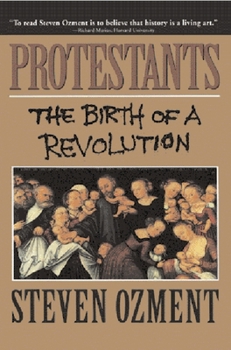Protestants: The Birth of a Revolution
Select Format
Select Condition 
Book Overview
Who were the first men and women who abandoned the Church of Rome and became the world's first Protestants? Harvard historian Steven Ozment does not present us with the remote, dusty figures of history, but rather with the shoemakers and housewives, students and politicians who were among the first followers of Martin Luther. Using pamphlets, diaries, letters, and other primary soruces, Ozment examines the origins of the Reformation and the nature...
Format:Paperback
Language:English
ISBN:0385471017
ISBN13:9780385471015
Release Date:October 1993
Publisher:Image
Length:284 Pages
Weight:0.96 lbs.
Dimensions:0.7" x 6.2" x 9.1"
Customer Reviews
2 ratings
What Did the Reformation Bring Us?
Published by Thriftbooks.com User , 16 years ago
Ozment writes as a skilled Reformation historian, who in this brief work asks, researches and answers this question, what did it bring us? When modern historians and sociologists and world religion ghurus answer it, they say very little. Ozment correctly observes that this was not the goal of the Reformers, nor did it become their heritage. The Reformation landscape included in this panaromic sweep is its finest attribute, I believe. He inquires not only into the theological and political arenas, but also into the social and economic fields, utilizing sources which don't just align with any desired outcome. He finds the Reformation truly lacking in any revolutionary way, but a theological fragmentation that continues to this day, with little political impact as some modern activist historians would desire. He understands well Luther's two kingdom teaching as it applies to the political scene, and fairly I think assesses Luther's minimal invasion of this turf, given that some critics think he should have been more focused on democratic freedom here. His astute analysis of Luther's impact on women, family, marriage, children and teenagers would have cheered the good Reformer's heart, as these were dear to him and Ozment fairly assesses some contribution to their well being which came from the Reformation. Overall this is extremely fair and well done venture, and shows the author to be very involved with the historical sources.
Religious Culture and Practice
Published by Thriftbooks.com User , 17 years ago
When a culture does not change much over a couple hundred years, major change over twenty years is a revolution. What, how, and when did the daily lives of the Germans change because of the Reformation? Steven Ozment records the Reformation as a reaction against oppressions of penance, indulgences, the sacraments, fasting, pilgrimages, and prayer to the Saints, and Church Mass. The Catholic Church had the effect of making people feel bad, impoverish, and to be mistreated by those appointed to rule the church locally. The author does not argue this was the goal of Martin Luther though many peasants- tradesmen then and scholars today wish it was. The Reformation did bring great political, social, and economic change but not the pace or in the desired way wanted. Luther wanted a theological revolution and wait on God to bring the result of the other. Never one who sought egalitarian justice, but did seek better treatment of each other with more accurate Christian training, better Christian values, and yes more consistent Christian regulation by the Government. But Luther did not believe in arm rebellion but the persuasion of those in power. If persuasion failed, then as Christians we are to obey the Government. I am afraid I have over emphasized Luther, when the bulk of the book is more a focus on the actual economic, social and political change wrought by the reformation. The book focuses on the peasants, tradesmen, women, and marriage. The new body of Christians lifted the heavy load of supporting monks, nuns, and Rome. More resources were free to support the poor. The Lutheran church focus more teaching on honesty in trade and in labor Government change came slower and by ability to persuade government officials. Much of the book deals with evidence how individuals felt about the circumstances. A good forty pages of the book deal with Luther's thoughts of woman, sexual relations, and marriage. The author makes a clear argument this is where Luther had a strong social impact that improved the lives of children and woman. I find this part of the book the most interesting.






